The industry often champions directorial debuts in Cannes, but rarer are the producers who land an appearance on the Croisette with their first features. Screen speaks to six first-time feature producers who scored the ultimate premiere.
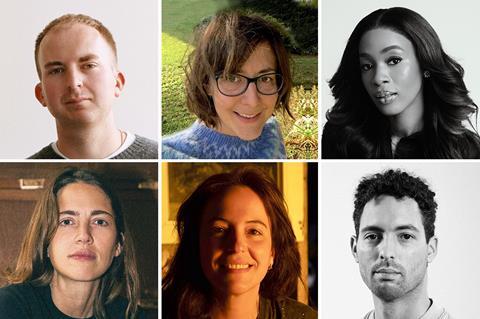
Archie Pearch - Devisio Pictures
Film: Urchin (Un Certain Regard)
Dir. Harris Dickinson
Other producer: Scott O’Donnell (Somesuch)
Producer Archie Pearch’s career changed in one moment — he was on a Zoom call at 9pm on a Tuesday night in early April when his sales agent, Carole Baraton of Charades, tried to reach him urgently. Could he call her back after his Zoom? Actually, no, she needed him now. In that moment, Pearch knew it was the call: Urchin, directed by Harris Dickinson, had been selected for Cannes’ Un Certain Regard.
“I completely froze, and just burst into tears. It was a moment like I’ve never experienced,” says Pearch, who got on FaceTime with Dickinson (at an airport flying home from the US) and fellow producer Scott O’Donnell of Somesuch, who was at home with his children. “It was surreal. I’m not sure it sank in even weeks later when the lineup was announced.”
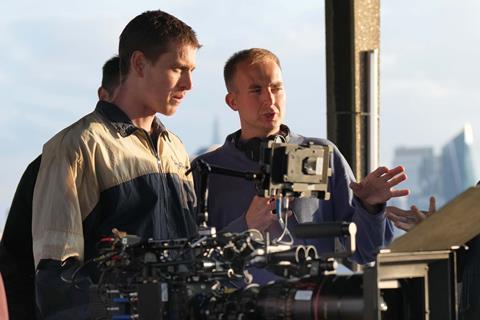
That call is exciting for any filmmaking team, but for Pearch, it was doubly so because this is his first feature film production, and it kickstarts the new company, Devisio Pictures, which he launched with Dickinson last year.
London-born Pearch started his career with work experience at Working Title, before becoming David Heyman’s assistant at Heyday Films. That day job had him in the trenches alongside the veteran producer on productions such as Wonka and Barbie.
“At the same time, I was producing short films and building relationships with other filmmakers,” he recalls. “Harris and I met through mutual friends around 2016. Even from that first meeting, we knew we shared very similar sensibilities.”
Pearch produced Dickinson’s short 2003 for BBC Film in 2021. They announced Devisio in May 2024, with the company’s backers including US financiers Tricky Knot, which also backed Dickinson’s feature debut alongside BBC Film and the BFI.
Urchin stars Frank Dillane as Mike, a rough sleeper in east London, trapped in a cycle of self-destruction as he tries to turn his life around. “Harris wanted to present it in such a unique way, showing a different perspective on people who are often overlooked,” says Pearch. “He’s managed to capture the social realism but also the magical realism elements beautifully, and the combination of those two worlds.”
They shot in east London on a budget of less than $6.4m (£5m). “The intention was to keep every aspect low-key,” says Pearch. “Even with the financing from BBC Film, BFI and Tricky Knot, we wanted to just have a tight team.” They also made the decision not to pre-sell to any distributors.
The film shot in 39 locations over a 25-day shoot, all the while — given Dickinson’s profile as an actor in films including Triangle Of Sadness and Babygirl — aiming to fly under the radar without any press attention. Pearch says his key takeaway on Urchin was “finding the right partners, and the people that you want to work with. Even though it was an intense subject, we managed to have fun as well. It was important to enjoy it and work with like-minded people.”
Of his production company partner, Pearch says he is excited for audiences to see Dickinson’s work as a director with a distinctive voice. “He has been very bold with his artistic choices,” says the producer. “He is a strong filmmaker telling a story that is incredibly powerful, and he has done it in an authentic and delicate way.”
Alexandra Mélot -Triptyque Films
Film: Imago (Critics’ Week)
Dir. Déni Oumar Pitsaev
After a 25-year career as an editor, Alexandra Mélot took the “life-changing” decision to focus on producing, joining Paris-based Triptyque Films, with which she had previously collaborated as an editor. Her first production Imago, directed by Chechen filmmaker Déni Oumar Pitsaev, will premiere in Critics’ Week at Cannes. The hybrid documentary follows Pitsaev building a home on a plot of land he inherits in Georgia’s Pankisi Valley, which borders Chechnya.
Mélot was on the festival circuit with Guillaume Massart’s doc In The Open when she met Pitsaev at Visions du Réel in 2018. She loved his short Looking For Déni and they spoke about his desire to make a feature. “At a certain point in the discussion, I said, ‘Well, I want to work with you,’” so she decided to become his producer. She started to wind down her editing jobs in the five years they were developing and raising finance for Imago.
“We had a beautiful adventure,” says Mélot, adding that the uniqueness of the story attracted funding from many sources: co-production from Need Productions of Belgium, Arte Cinéma and RTBF, and development support from the Sundance Institute, CNC and Eurimages. They pitched it at industry events including Eurodoc, Hot Docs, Sheffield Doc/Fest and Locarno. Rediance has boarded sales and Imago marks the first feature film in the history of Chechen cinema to be shown at Cannes.
It was not an easy production: the area where they filmed had been called the ‘Valley of Jihadists’ and some embassies advise tourists not to visit. Mélot made her first trip to the valley in 2019 with Pitsaev. “We discovered this beautiful land, these incredible people, who welcomed us like kings or queens,” she recalls. “That’s when I understood we could produce this film.”
Melot jokes that as an editor, “I used to go too far and maybe even act like a producer. I was always challenging the producers, and I was very close to the directors. Producing is a harder job than I thought.” Now, Tryptique has a slate of documentary features in development, and she is also developing some hybrid projects on the side.
“When you are editing, you are seeing all the problems the film had during the production — the director will say, ‘We couldn’t do that, we couldn’t do this,’” she says. “When I began as a producer, I didn’t want to work like that. I wanted to give all the possibilities to the director. I wanted to invest that money to make it better for Déni.”
Funmbi Ogunbanwo - Fatherland
Film: My Father’s Shadow (Un Certain Regard)
Dir. Akinola Davies Jr
Other producer: Rachel Dargavel (Element Pictures)
Akinola Davies Jr’s debut My Father’s Shadow marks another Cannes first: the first Nigerian director to bring a Nigeria-set fiction feature to Cannes’ official selection. My Father’s Shadow is a semi-autobiographical story about a father and his two sons over a single day in capital city Lagos during the 1993 Nigeria election crisis.
The Nigeria-UK co-production unites the production team of Funmbi Ogunbanwo of Fatherland with Rachel Dargavel of Element Pictures. Lagos-based Fatherland, which Ogunbanwo founded in 2018 alongside screenwriter (and Akinola’s brother) Wale Davies, is experienced in commercials and shorter digital content, as well as TV movies such as You Me Maybe.
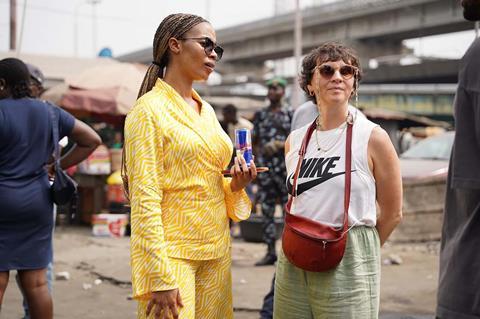
Ogunbanwo had a steep learning curve for her first theatrical feature production, and needed to understand the ways of UK financiers (the film has backers including BBC Film, BFI and Mubi; sales are handled by Germany’s The Match Factory), so it was useful to collaborate with the more experienced Dargavel, who had moved from Potboiler to Element. They had worked together on Davies’ 2020 short Lizard, which was nominated for a Bafta and won a Sundance prize.
“It’s been one of my best collaborations,” says Ogunbanwo. “In many ways, Rachel has mentored me. She brings experience and expertise but also openness. She was open to collaborating on the entire process and having a dialogue about what was best for the film, and could also listen to Fatherland’s expertise in our home environment, so we have a lot of Nigerian HoDs. The crew was about 80% Nigerian, with some expertise brought in from the UK, like DoP Jermaine Edwards.”
The film shot for about six weeks entirely in Lagos and Ibadan. One practical lesson that Ogunbanwo learned was how insurance worked for a Nigeria-UK co-production, which was not the typical way a film would be insured in Nigeria. She jokes that she became “part banker”, dealing with the currency fluctuations and conversions.
“Akinola has a very clear perspective and point of view. He is not afraid to experiment and tell you what he’s trying to say with images,” she concludes. “I want to tell these stories from the continent that are fuller, more robust and more complex than we’ve typically seen.”
Johanna Nahon - After Hours Production
Film: The Girls We Want (Directors’ Fortnight)
Dir. Prïncia Car
Johanna Nahon met Prïncia Car and Léna Mardi a decade ago, when working at CG Cinema and attending Directors’ Fortnight in support of Mustang. Now, they return with their own film — Nahon has produced Car’s debut feature The Girls We Want (Les Filles Desir), co-written by Mardi. Sold by SND and co-produced by France 3 and Zinc, the film is about a group of friends one summer in Marseille.
“When the call came, I was overjoyed. I was in the street so I couldn’t scream, and Prïncia was on a train so she couldn’t either,” Nahon says with a laugh. “Since we met in 2015, it’s been our dream not just to be selected for Cannes, but to create something that would one day be seen.”
Nahon is the co-founder of new production outfit After Hours Production, having previously worked at Celluloid Dreams and Wild Bunch, as well as in curation. In the decade since they had first met, Car had launched an alternative film school in Marseille.
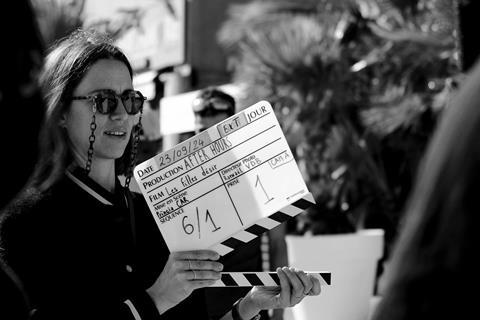
“For me, producing has always been about the people behind a project first, more than the story itself,” says Nahon. “So when Prïncia came to me to talk about the workshops she was running in Marseille and showed me her short films, I was completely drawn in. The way they approached identity, relationships and self-discovery felt urgent and contemporary.
“We had to build credibility step by step,” adds Nahon of raising finance for a debut film without a name cast. “That meant applying to labs, residencies and development programmes to gather quality labels and support from institutions.”
They earned the Découverte label from the Prix du Scénario, participated in the Angers workshops and Les Arcs co-production market, and also got funding from Region Sud.
Filming was “intense, a lot of night shoots in real locations,” and her new company was limited in its cashflow. “There was constant financial stress but, despite that, the shoot was joyful,” she says. “There was a shared belief in the story.”
After Hours, which Nahon launched alongside partners Jérôme Benadiner and William S Touitou, is named in honour of Martin Scorsese’s 1985 film — and their ambition is “to make films that sit at the intersection of auteur cinema and popular storytelling.”
Next up, they are co-producing an Olivier Baroux comedy with Gaumont, exploring masculinity through the lens of hair loss. Nahon will also produce a lesbian romantic comedy with director Laura Weaver as a co-production between After Hours and Iconoclast.
Marina Garcia Lopez - Sintagma
Film: Sleepless City (Critics’ Week)
Dir. Guillermo Galoe
Other producers: Marisa Fernandez Armenteros (Buenapinta Media), Manuel Calvo (Encanta Films), Alex Lafuente (BTeam Prods), Damien Megherbiand and Justin Pechberty (Les Valseurs), and Anne-Dominique Toussaint (Tournellovision)
Marina Garcia Lopez of Spain’s Sintagma Films says working on Sleepless City (Ciudad Sin Sueño), Guillermo Galoe’s feature debut, has been a “deeply transformative experience”. Garcia Lopez is one of seven producers on the Spain-France co-production, which premieres in Critics’ Week and is sold by Best Friend Forever.
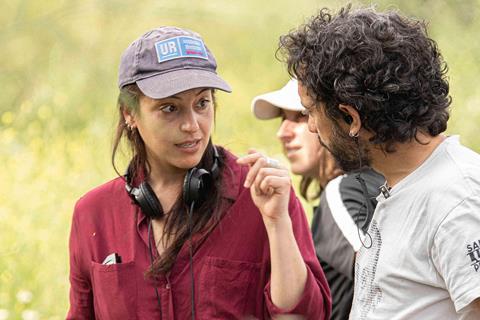
“I have learned that, beyond management, logistics and financing, producing means creating a safe space for the voices within the film,” she says.
“In this case, we were working with a real community” — residents of the illegal shantytown La Cañada Real, on the outskirts of Madrid — “and it was crucial throughout the process to ensure something as invasive as a film shoot, especially one that involved people working for the first time in a movie and inside their own homes, could become a safe space that protected the individuals and their vulnerabilities. I believe this also allowed the community to tell their story from within.”
Garcia Lopez also learned, like any good producer, “the importance of being flexible… being prepared for constant changes and having the ability to adapt and solve problems during the shoot.”
It helps that she had a shorthand with the director, who is her brother, and who makes his fiction feature debut after directing the Goya-winning documentary Delicate Balance.
It was an emotional moment when Sleepless City was accepted for Cannes, following a six-year journey that included stops at Cannes Cinefondation Residence, TorinoFilmLab and more. “For the non-professional actors, the streets and lives we portrayed, and what it meant for their voices to be represented at Cannes, I felt that this selection was not only a recognition of the film but also a recognition of them,” says Garcia Lopez.
Vincent Saunders - Goodtime Pictures
Film: A Light That Never Goes Out (Acid)
Dir. Lauri-Matti Parppei
Lead producer: Ilona Tolmunen (Made)
A Light That Never Goes Out in the ACID selection at Cannes is Finnish director Lauri-Matti Parppei’s directorial debut — and the first fiction feature co-production for Norway’s Vincent Saunders, who began his journey in the film industry as a production driver, then a production assistant. “I thought I’d have a go, why not produce?,” says Saunders, whose company Goodtime Pictures started with co-producing documentary series such as Food Markets.
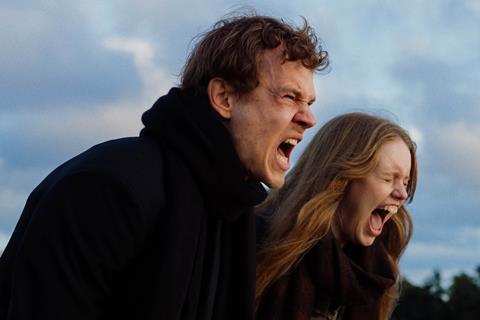
A mutual friend introduced him to Ilona Tolmunen of Helsinki-based Made, the lead producer of A Light That Never Goes Out, which tells the story of a classical musician who returns to his small Finnish hometown to recover after a breakdown.
Tolmunen was setting up the feature as a Finland-Norway-Germany co-production but when the German partner did not work out, Saunders was able to secure funding in Norway from the regional public and private Zefyr Media Fund (the production also hired a Norwegian make-up artist). While he visited the Finnish shoot briefly, Saunders was more on hand during post in Bergen.
Working as a co-producer reinforced the importance of the right partners. “It’s about working with passionate, talented people,” says Saunders, who also learned, like Nahon, the incremental importance of those industry seals of approval: A Light That Never Goes Out went to Les Arcs Talent Village in 2019, Finnish Film Affair pitch in 2019, Nordic Film Lab in 2020 and Göteborg Film Festival Discovery co-production platform in 2020.
“That means something for the finance, too,” he says. “Those steps were a good selling point to get finance here in Norway.















![[L-R]: Amanda Villavieja, Laia Casanovas, Yasmina Praderas](https://d1nslcd7m2225b.cloudfront.net/Pictures/274x183/6/4/1/1471641_pxl_20251224_103354743_618426_crop.jpg)









No comments yet